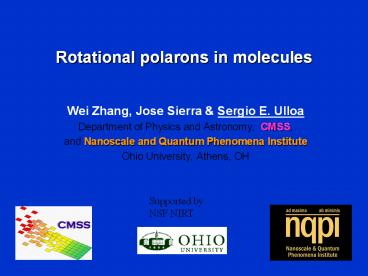Rotational polarons in molecules - PowerPoint PPT Presentation
Title:
Rotational polarons in molecules
Description:
... HOMO-LUMO. 6. Structure correlation enhances transport: IV curves ... Local-twist long-chain model. polaron energy shift: electron-phonon coupling constant ... – PowerPoint PPT presentation
Number of Views:86
Avg rating:3.0/5.0
Title: Rotational polarons in molecules
1
Rotational polarons in molecules
- Wei Zhang, Jose Sierra Sergio E. Ulloa
- Department of Physics and Astronomy, CMSS,
- and Nanoscale and Quantum Phenomena Institute
- Ohio University, Athens, OH
Supported by NSF NIRT
2
Outline
- Motivation long / complex molecules electronic
transport - Effect of structure on static properties
correlations ? transport enhancement - Dynamical disorder torsion and electron
interaction ? twist polarons
3
l
l-disulfide
Experimental results by B. Hartzell, J.J.
Heremans and V. Soghomonian APL 82, 4800 (2003)
JAP 94, 2764 (2003) Supported by NSF DMR
0103034
Results Finite conduction Repeatable
l-disulfide
4
Motivation Complex / long molecules as
conductors
Phthalocyanine-X molecular metals
TTF-TCNQ system
DNA
5
Structure begets function
Bases stack ? ?-way for electron hopping
HOMO-LUMO
Different sequences / structure ? properties
www.accessexcellence.org
6
Structure correlation enhances transport IV
curves
Local structure correlation leads to enhancement
of transport Additional correlation in
sequences improves IV curves
A random sequences with local correlation ?
typical ?-DNA B random sequences without local
correlation ? Anderson limit C random dimer
sequences with local correlation
Zhang Ulloa PRB (2004)
7
Dynamical effects
Molecular systems have flexible structure so
that twist or rotational degrees of freedom are
important Kenkre PRB 99 Bruinsma PRL
00 Conwell PNAS 00 Yu PRL 00
Stacking angle 36o
Soft torsional mode 10-20 cm-1
Swaminathan, et al JACS 113, 5027 (1991)
Strong e-ph coupling?
8
Guanosine assemblies and the role of ?-?
bondingR. Di Felice, A. Calzolari, E. Molinari
A. Garbesi PRB 2002
relative twist yields narrower bands
strong coupling to torsional phonon!
9
Relative-twist polaron
? relative rotation between molecules
Two-site model ?
rotation dependent hopping t1 e-ph coupling
anharmonic oscillation
For large K, small rotations, phonon frequency w
K
Wavefunction
Zhang et al PRB 66 060303 (2002)
10
Relative-twist polaron solutions
Mathieu functions
For ex, for large K
harmonic
11
Non-adiabatic regime
stiff spring
The effective splitting of the two
levels is
Effective hopping increases with frequency
K
?stiffer ? better transport
12
Adiabatic regime
soft spring / fast hopping
Effective hopping increases with electron- phonon
coupling
if soft ? better transport with stronger
coupling !
13
Local-twist two-site model
anharmonic oscillation nonlinear local
interaction
Complex level structure for stiff / soft mode
Hopping?
14
Local-twist two-site model
transport is suppressed for all K for ground
state (not for excited states!)
local coupling very different from
twist-dep hopping
15
Local-twist long-chain model
nonlinear interaction anharmonic oscillation
electron-phonon coupling constant
polaron energy shift
narrower bandwidth larger effective
mass
16
Local-twist long-chain model (contd)
In strong coupling / soft mode regime
polaron energy shift
bandwidth
vs usual vibrational Holstein polaron bandwidth
weaker power-law reduction of bandwidth for
local-twist polaron
Even in worst case of local coupling,
expected polaron trapping is weaker excited
states exhibit delocalization
17
Conclusions
- Local structural correlation between on-site
energy and off-site hopping enhances charge
transport - Additional sequence correlation improves
transport - Twist-dependent hopping ? enhanced transport
for soft modes - Local twist-coupling yields power-law
- vs exponential bandwidth renormalization
- Role of excited polaron states interference
effects between twist- and vibrational phonons?































